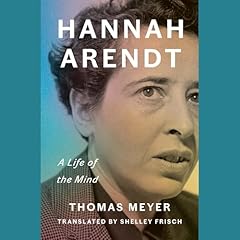
The Life of the Mind
No se pudo agregar al carrito
Add to Cart failed.
Error al Agregar a Lista de Deseos.
Error al eliminar de la lista de deseos.
Error al añadir a tu biblioteca
Error al seguir el podcast
Error al dejar de seguir el podcast
Prueba gratis de 30 días de Audible Standard
Compra ahora por $30.76
-
Narrado por:
-
Laural Merlington
-
De:
-
Hannah Arendt
Considered by many to be Hannah Arendt's greatest work, published as she neared the end of her life, The Life of the Mind investigates thought itself, as it exists in contemplative life. In a shift from her previous writings, most of which focus on the world outside the mind, this work was planned as three volumes that would explore the activities of the mind considered by Arendt to be fundamental. What emerged is a rich, challenging analysis of human mental activity, considered in terms of thinking, willing, and judging.
This final achievement, presented here in a complete one-volume edition, may be seen as a legacy to our own and future generations.
©1971 Hannah Arendt; copyright 1977, 1978 by Harcourt, Inc. (P)2018 TantorLos oyentes también disfrutaron:




















Las personas que vieron esto también vieron:


















love the book, Hannah is a master.
Se ha producido un error. Vuelve a intentarlo dentro de unos minutos.
Thought-provoking and well-executed
Se ha producido un error. Vuelve a intentarlo dentro de unos minutos.
Well Read, Articulate and Expressive
Se ha producido un error. Vuelve a intentarlo dentro de unos minutos.
Need a better reader
Se ha producido un error. Vuelve a intentarlo dentro de unos minutos.
But I suggest reading it in book form rather than this audible version.
The narrator is unused to philosophical material, cannot pronounce the names of some of the world's great philosophers and is incapable of pronouncing non-English words in a comprehensible fashion. Heidegger is pronounced as "Hydecker", Paul Valery becomes Paul Velery (rhymes with celery) and the introductory quotes to each chapter in French, German and Latin are butchered completely beyond comprehension for a speaker of those languages. It is shocking that this could happen to such an important book.
Audible should re-record the foreign language parts with a narrator who can pronounce the words properly, preferably someone who speaks both German and French. This recording is potentially damaging to the reputation of all involved and I am sorry to say should be promptly corrected without regard to cost.
A great book marred by shockingly poor narration
Se ha producido un error. Vuelve a intentarlo dentro de unos minutos.


